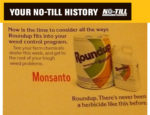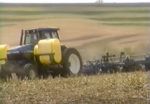Advertise Follow Us
No-Till History
With no prior cropping knowledge, John Franz was an unlikely candidate to permanently change agriculture’s fortunes in 1970 – when all other Monsanto chemists wanted no part of a dying research project.
Read More
Herbicide History, Part II: No-Till Rallies on Roundup
No-till’s greatest growth came with the discovery of glyphosate as a weedkiller, and growers started to ‘park the plow.’
Read More
Memories from Western Canada – The Schmeiser Family Farm
Son of the late Percy Schmeiser – who famously battled Monsanto – recounts no-till’s memories in Saskatchewan.
Read More
No-Till’s Herbicide History, Part I
No-till was a ‘no-go’ until modern weed-control chemicals arrived on the scene.
Read More
North Carolina Shares in No-Till History, Too
Kentucky isn’t the only state to mark a no-till first. North Carolina claims one of its own farmers also put their no-till crop in during 1962.
Read More
Timeline of Herbicide Developments
As weed-control products came of age in the decades after World War II, no-tillage was given a chance to become a viable practice.
Read More
From The Archives: No-Till Gets More Attention Among Soil Conservationists
(August 1982 No-Till Farmer)
Read More












